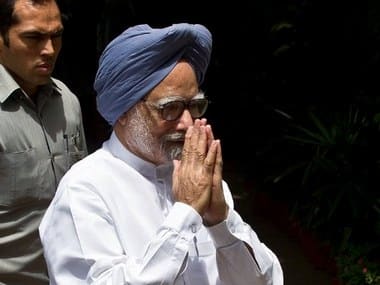Hong Kong: For the Indian abroad, Independence Day markers, of the sorts that happened on Wednesday, traditionally come with mixed emotions. However well the NRI may have done abroad, and however much he may have ‘gone global’ with his skills, a part of him still gives way to maudlin sentimentalism whenever the tricolour flag goes up, and the national anthem is sung. And even in the age of e-mail and har-haath-mein-mobile communication, Pankaj Udhas’ rendition of_ Chitti Aai Hai _induces a lump in his throat.
But in equal measure, in private conversations, he will confide with uncharacteristic candour to enormous relief at having escaped the madness of it all. The prevailing sentiment, as one particularly successful NRI told me yesterday, is: “Thank god I don’t have to go back there - except for family weddings.”
[caption id=“attachment_418567” align=“alignleft” width=“380”]
 Manmohan Singh’s speech was the same-old, same-old. AFP[/caption]
Manmohan Singh’s speech was the same-old, same-old. AFP[/caption]
The sentiment among overseas investors, who had ventured to put their money where their mouths were - in India - soon after 2009 is even more downbeat. Their faith in the India story, which they had genuinely believed held potential, today lies shattered. Having given it a fair shot, they’re just about ready to throw in the towel.
One particular conversation I had with the head of a multinational that is invested in India in partnership with an Indian conglomerate is illustrative. The executive, who figures on Forbes’ rich lists, said that his company was on the verge of walking out of what the UPA 2 government had identified, in its 100-day plan unveiled in May 2009, as an “iconic” project - that is one, that would be taken up for speedy approval.
Impact Shorts
More ShortsThe reason why he is walking out? More than 1,000 days after that 100-day promise was made, the companies are facing a bureaucratic runaround. And even though both the multinational and the Indian partner are sufficiently well-connected within the UPA, they haven’t been able to cut through the reams of red tape. Meanwhile, project cost estimates have more than doubled, rendering it potentially unviable. “It’s downright frustrating,” the executive said, not with any emotion, but rather matter-of-factly, in the manner of someone who has resigned himself to cutting his losses. It’s a fair bet that he - and his peers to whom he’s shared his bitter experience - won’t be putting down any money in India for a long while.
Nor is this the only case of investors regretting the folly of believing the UPA’s promises of 2009. Fund managers with international fund houses were, soon after that election result came out, positively rapturous with expectations of what the government could achieve.
In a mood of over-the-top bullishness, Ed Pulling, the managing director for the Pacific Regional Group of JF Asset Management, told me in June 2009 (barely a month after the UPA had been returned to power) that his confidence in India as an investment opportunity was close to its highest at that point. The opportunity thrown up by political alignments accounted for a large part of his positive outlook on India.
“Put it this way,” he had said at that time. “From a political perspective, this is the best I’ve ever experienced. And I think there is also upside politically. If the Congress executes well over the next three to five years, there is a chance that the next time their position could be even stronger. I haven’t been able to say that for at least 10 years. I’ll be honest: I misread the political outcome. I adhered to the theory that there will be more fragmentation, that provincial parties would increase their influence. So this has been a very surprising outcome for me.” ( Read the entire interview here .)
Today, it’s a fair bet that Pulling is, well, pulling his hair out in frustration.
But this mounting frustration among multinational business houses and fund houses appears to have been entirely lost on Prime Minister Manmohan Singh and the UPA government. For all the spin that Singh put on things in his Independence Day address to the nation on Wednesday, and for all hisplatitudes about elevating economic development to “national security” interests, nothing about his speech conveyed a sense of urgency about arresting the downward spiral in the India growth story.
And although there is some merit to Singh’s point that the absence of a broader political consensus across the political spectrum is slowing down the economy, his failure to address the policy conflicts within his own government, and even within his own party, which have ground down the govenment to a state of masterly inactivity, is striking.
When 100-day promises don’t get delivered even a thousand days later, what merit is there in Manmohan Singh parroting the same promises today? Why are they any more believable today?
And what purpose is served by the Prime Minister resorting to the preachy language of editorial writers in economic dailies in saying the government “should stimulate growth” and “should fight inflation” and so on?Unlike editorial writers, he has the policy levers to begin to address the problems. Singh should leave economic punditry to less influential commentators. Far more productive for him to produce an ounce of action - and spare us the pounds of hot air he dished out on Independence Day.
Venky Vembu attained his first Fifteen Minutes of Fame in 1984, on the threshold of his career, when paparazzi pictures of him with Maneka Gandhi were splashed in the world media under the mischievous tag ‘International Affairs’. But that’s a story he’s saving up for his memoirs… Over 25 years, Venky worked in The Indian Express, Frontline newsmagazine, Outlook Money and DNA, before joining FirstPost ahead of its launch. Additionally, he has been published, at various times, in, among other publications, The Times of India, Hindustan Times, Outlook, and Outlook Traveller.
)